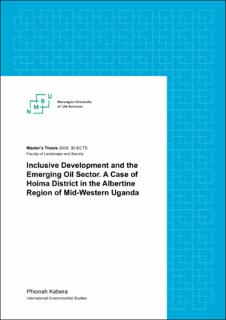| dc.description.abstract | This thesis presents the findings of a study on inclusive development and the emerging oil sector in the Albertine region in mid-Western Uganda. The study sought to find out the level of stakeholder involvement in oil and gas activities at the various levels. The study also aimed at assessing the current environmental governance framework as well as examining the impact of the emerging oil sector in the Albertine region. Furthermore, the study adopted a case study design and qualitative approach. A total number of 44 respondents comprising of residents of Kaiso-Tonya village and Key Informants at the district and national level provided the primary data. Information was therefore, obtained by use of household survey questionnaire and key informant interviews. The collected data was analysed in a thematic way by applying descriptive statistics following the study objectives. The study findings revealed that there were attempts of involving stakeholders, however, the study participants generally reported that stakeholder involvement and consultation was not adequate, especially at the district and local community levels. Local leaders believe that local masses were not adequately sensitised and prepared on what to expect from the oil sector. The study findings demonstrate that oil exploration activities in the region have caused numerous impacts, which are socio-economic and environmental in nature. There has been mixed perceptions on these impacts with people reporting positive, negative and a combination of both impacts. On a positive note, there has been evident infrastructural development in form of roads, hotels, schools and health facilities, employment and business opportunities, among others. Some of the negative impacts revealed by the study include; pollution of natural resources, wetland loss, wildlife disturbance, soil erosion, limited land, increased crime rate, increased pressure on available resources and increased land conflicts due to the growth in population. The study recommends that in order to minimize or avoid future negative externalities, proactive engagements of stakeholders at different levels should be scaled-up. | en_US |

